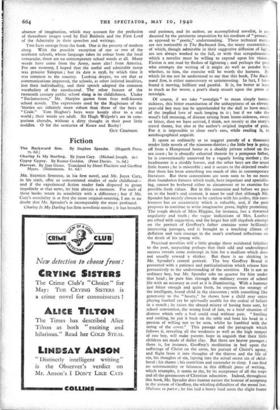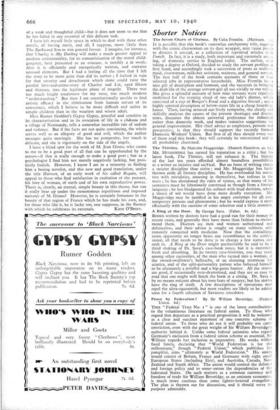Fiction
The Backward Son. By Stephen Spender. (Hogarth Press. 75. 6d.) Myers. (Heinemann. 8s. 6d.)
MR. STEPHEN SPENDER, in his first novel, and Mr. Joyce Cary, in his sixth, offer us concentrated studies of male childhood— and if the experienced fiction reader feels disposed to groan impolitely at that news, let him abstain a moment. For each of these books wears its sensibility with a difference ; but if Mr. Cary's sensibility is at first the more original-seeming, I am in no doubt that Mr. Spender's is incomparably the more profound.
Charley Is My Darling has firm novelistic merits ; it has breadth and patience, and its author, an accomplished novelist, is un- daunted by the persistent imposition by his medium of "prosaic," as opposed to "poetic," understanding. These technical meths are not noticeable in The Backward Son, the many eccentricities of which, though admirable in their suggestive diffusion of are not always worked to the full, or with that scrupulousness which a novelist must be willing to expend upon his visions. Fiction is not read by flashes of lightning ; and perhaps the poet who attempts the writing of it might do well to ponder first whether, to him, the exercise will be worth the harness. By which let me not be understood to say that this book, The Back- ward Son, is either unnecessary or uninteresting. In fact, I have found it moving, brilliant and painful. It is, for better at least as much as for worse, a poet's sharp assault upon the prose o' nostalgia.
Of course, if we take " nostalgia " to mean simply home- sickness, this bitter examination of the unhappiness of an eleven- year-old boy may not be apprehended by the dull to have much of the implied love of such longing in it ; but if we take the word's full meaning, of disease arising from home-sickness, sweet or bitter, then we have arrived, I think, not merely at the story's stated theme, but also at the author's original impulse of pain. For it is impossible to close one's ears, while reading it, to autobiographical anguish.
It opens so ordinarily as to suggest parody of a thousand tender little novels of the nineteen-thirties; the little boy Is going off from a Hampstead home to a shoddy private school on the sea coast; he is absurdly exhorted thereto by a pompous father, he is conventionally unnerved by a vaguely loving mother; the headmaster is a shoddy horror, and the other boys are the usual little brutes ; he is miserable ; and it occurs to the dejected reader that there has been something too much of this in contemporary literature. But these conventions are soon seen to be no more than foundation fixtures which truth, here impatient and specialis- ing, cannot be bothered either to circumvent or to examine for possible fresh values. But in this connexion and before we pass on to the book's real content, it must be said that although Mr. Spender has mainly chosen to be careless with his asides, this care- lessness has an eccentricity which is valuable, and, if the poet proposes to continue to write imaginative prose, highly promising. The rough sketch of Miss Higgins, for instance, has a thwarted angularity and truth ; the vague indications of Mrs. Leather are rifted with suggestion, and the larger but still slapdash attempt on the portrait of Geoffrey's father contains some brilliantly interesting passages, and is brought to a touching climax of deflation and vain courage in the man's confused reflections on the death of his young wife.
Practised novelists will a little grudge these accidental felicities to the poet, suspecting perhaps that their odd and undeveloped success reveals some contempt in him for a medium which does not usually reward a shirker. But there is no shirking in Mr. Spender's central portrait. The boy Geoffrey Brand is presented with a patience and particularisation which release him persuasively to the understanding of the sensitive. He is not an ordinary boy, but Mr. Spender asks no quarter for him under that head ; he puts him through the ordinary events of school life with an accuracy as cool as it is illuminating. With a humour just bitter enough and quite fresh, he exposes the strategy of the intelligent, bored child in the classroom ; with something like generosity to the "hearty," he shows how a child may enjoy playing football yet be spiritually unable for the ordeal of failure in a match ; he raises the absurd misery of having been sent, by school convention, the wrong kind of jam, to a brief situation of distress which only a fool could read without pain. "Smiling and smiling, he put it back on the table and bent his head in a passion of willing not to be seen, whilst he fumbled with the string of the cover." This passage and the paragraph which follows it, revealing all the weakness as well as the high temper of one boy, will make parents hope in anguish that their little children are made of duller day. But there are braver passages ; there is, for instance, Geoffrey's meditation in bed upon the sufferings of Christ on the cross, his pursuit of Christ's agony, and flight from it into thoughts of the thieves and the life of sin, his thoughts of sin, lapsing into the actual secret sin of child- hood ; his shame ; his contrition and surrender to sleep. I can find no sentimentality or falseness in this difficult piece of writing, which triumphs, it seems to the, by its acceptance of all the traps and all the greatnesses of Christian education. Indeed, throughout this book, Mr. Spender does human nature the honour of accepting in the person of Geoffrey, the whirling difficulties of the moral law. Multum in parvo ; he has laid a heavy load upon the slight frame of a weak and thoughtful child—but it does not seem to me that he has failed in any essential of this delicate task.
I have left myself little space in which to deal with three other novels, all having merit, and all, I suppose, more likely than The Backward Son to win general favour. I imagine, for instance, that Charley is My Darling will make a much greater appeal to modern sentimentality, for its romanticisation of the moral child- gangster, here presented as .an evacuee, is terribly ri la mode. Also it is efficiently and energetically written, and contains unusual elements. But I had a feeling all the time that I felt the story to be more grim than did its author ; I looked in vain for that severity and detachment which alone could raise the painful love-and-crime-story of Charley and Liz, aged fifteen and thirteen, into the legitimate plane of tragedy. There was too much bright tenderness for my taste, too much modern "understanding." But then I am constitutionally unable to find artistic efficacy in the elimination from human nature of its conscience, which I believe to be more difficult and active in simple children than in the weariest and wisest adult.
Miss Rumer Godden's Gypsy Gypsy, graceful and sensitive in its characterisation and in its evocation of life in a château and a village of Normandy, tells a somewhat incredible tale of sadism and violence. But if the facts are not quite convincing, the whole serves well as an allegory of good and evil, which the author manages quite movingly. She has no pomposity, her touch is delicate, and she is vigorously on the side of the angels.
I have a blind spot for the work of M. Jean Giono, who seems to me to be a good poet of all that can be apprehended by the senses—if that is really enough to make a good poet ; but as a psychologist I find him not merely negatively lacking, but posi- tively foolish. However, I know I am in a minority in finding him a boring novelist, and this new and good translation, under the title Harvest, of an early work of his called Regain, will appeal to those who find satisfaction in exaltation of the peasant, his love of woman, of earth and of his own reproductive power. There is, clearly, an eternal, simple beauty in this theme, but can it really bear up under the monotonous repetitions and imposed naivetes of M. Giono? However, he is certainly fortunate in the beauty of that region of France which he has made his own, and, for those who like it, he is lucky too, one supposes, in the fluency -m........„,,•■■•■••■„,.•■■■•••■,................,0■■•■■Willi































 Previous page
Previous page